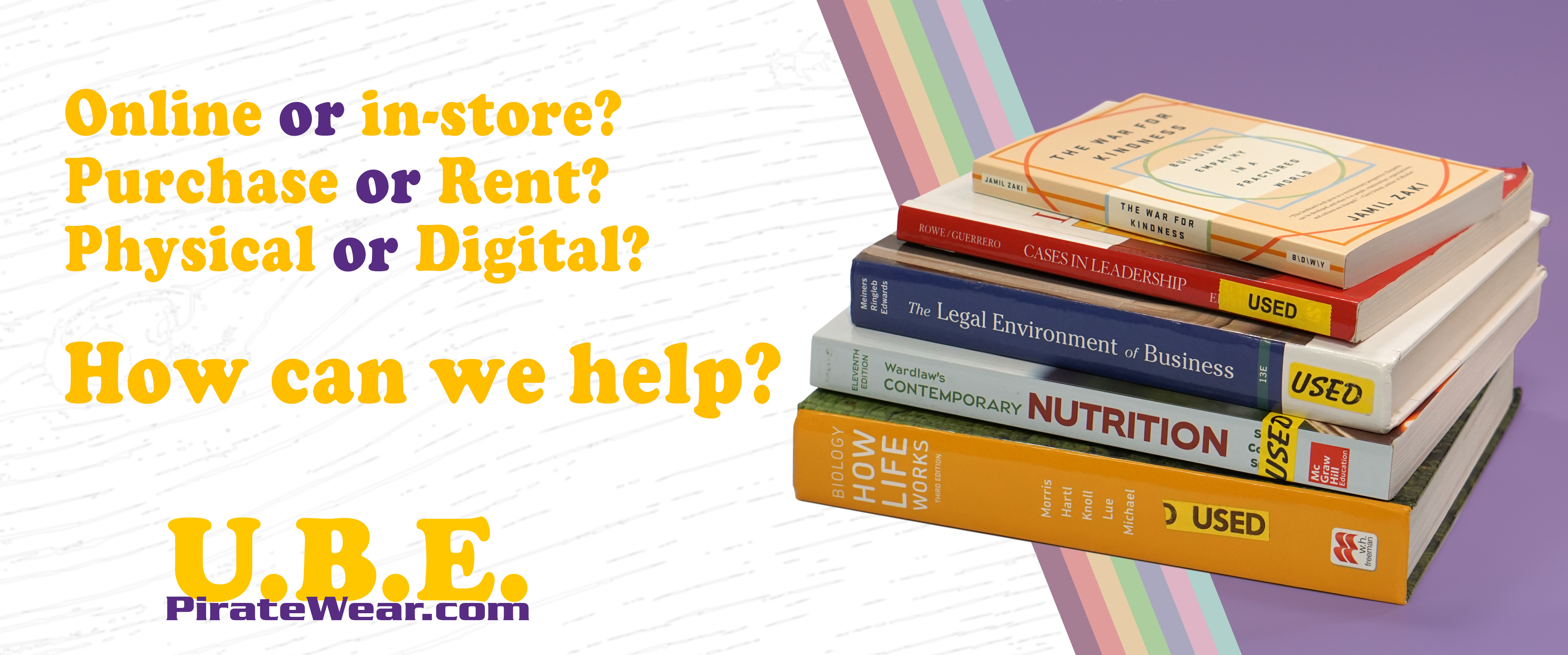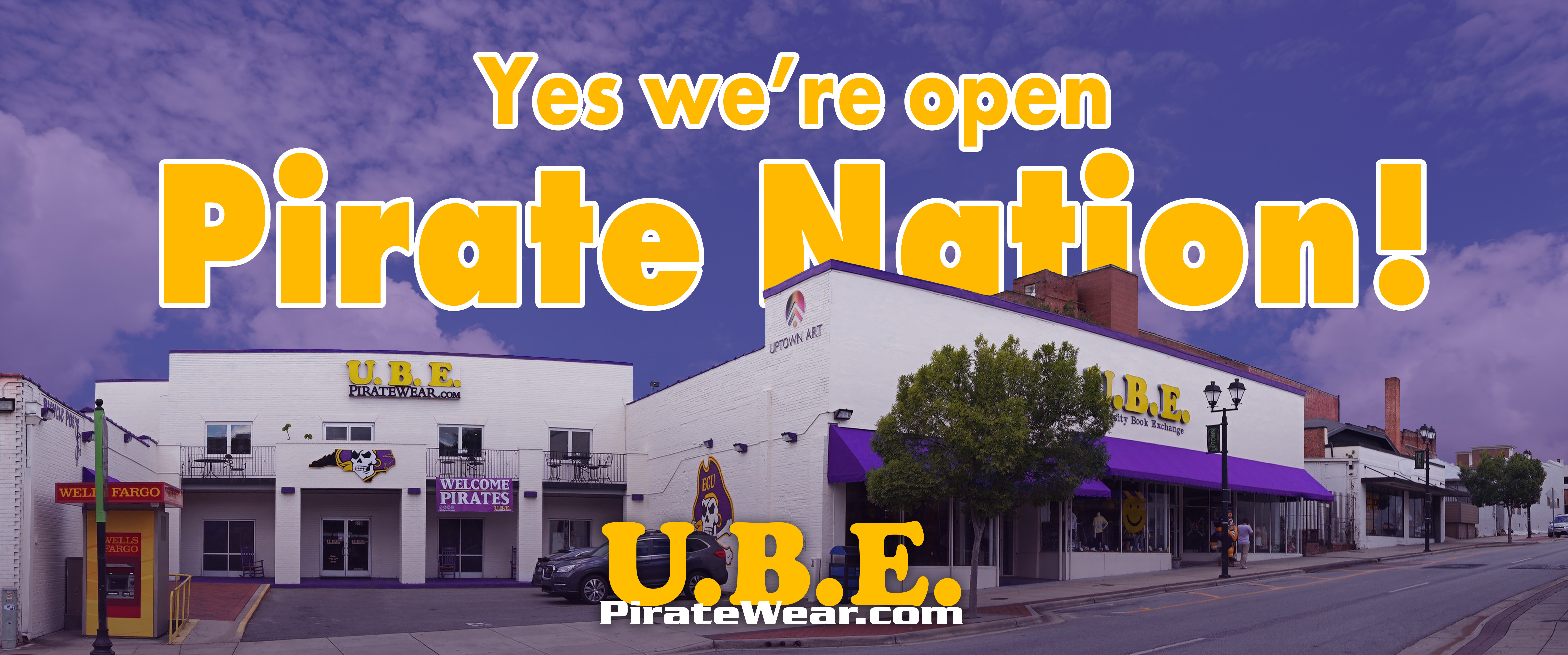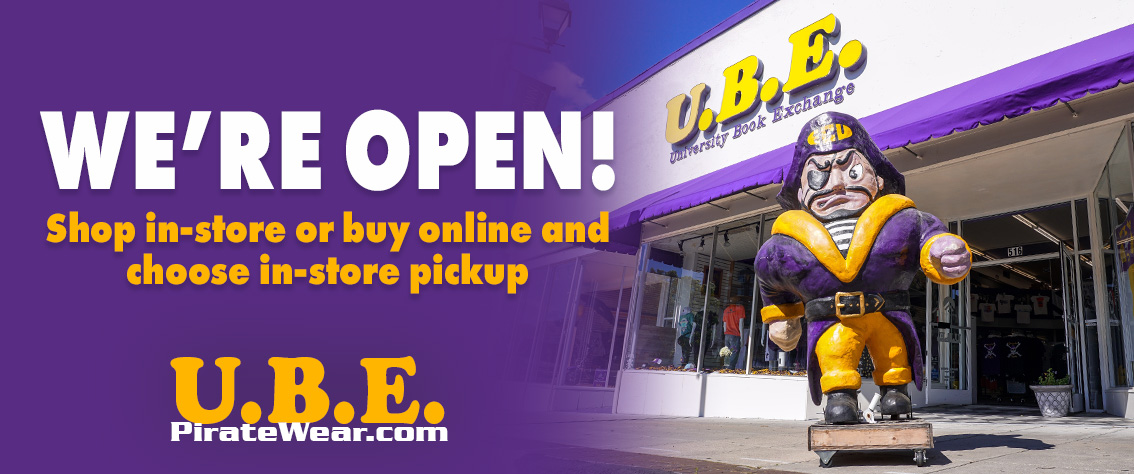
Information on Buying and Renting Books
Don't Need Any Advice?
Click Here to Start Shopping.
Otherwise, Read On!
Using the Website
To search for your books, you'll need to know your course information: Department, Course Number, and Section Number.
Course numbers are always a four-digit number, and section numbers are always a three-digit number.
So for example, if you're taking General Biology, your course info might read: BIOL 1050, Section 001.
For ENGL 1100 and 2201 Classes: If you do not see your section number in the list, you likely have a graduate student for your instructor, and you should select the section labeled GRAD to select your books.
Your Book List
Once you've selected your courses, hit the Find Books button to be taken to a list of your books for each class.
Each book will show a New and Used Purchase Price. There will also be a button next to each price, either reading Add to Cart or Out of Stock.
Below the purchase prices, there may be drop-down lists showing if the book is Rentable, or if there's an Ebook version available.
The Ebook Option
If you choose an ebook from the drop-down list, you'll be receiving an access code through a company known as RedShelf. The drop-down may show you different price options based on how long you want access to the ebook. Simply select the option you want, and it will be added to your cart. In this case, we email the ebook code to you when we have processed your order. Please note that ebook options NOT purchased through the ebook drop-down menu are actual physical cards with codes printed on them. For those, you'll either have to come to the store for pick-up, or have them shipped to you. Speaking of which...
Shipping vs In-Store Pickup
We can either ship your books to you (in which case there will be a shipping fee), or you can choose the In-Store Pickup option (for which there is no additional charge). Please note that you'll be asked to enter a shipping address regardless of which option you want. It's an annoying thing our website does, for which we apologize. But you'll still be able to choose in-store pickup as your shipping method before the end of your transaction.
BUYING vs RENTING vs FIRST DAY INCLUSIVE ACCESS
It's no secret that textbooks can be expensive. So the question becomes, do I want to buy or rent? And what about this First Day thing? Those decisions vary from semester to semester and book to book, but here's a quick explanation of how it all works:
Renting a book means that you pay less for it up-front, but you have to return it to the store at the end of the semester, and you get no money back. Often, we can offer a rental price so low that it's your best option. But not always.
Buying a book means that you pay more for it up-front, but you'll have the opportunity to sell it back to us at the end of the semester. If it's a book we need for the following semester, we'll often pay you half the new shelf price for it. If we don't need it for the following semester, we offer you whatever the value of the book is on the national wholesale market. That can be anything from a decent amount of money to a price so low that we're a little embarrassed to offer it. So you're taking a chance when you buy, but the gamble could pay off in cold hard cash at the end of the semester.
First Day is an option being offered by the university, in which you rent your books for the semester as part of your tuition and fees. It's a program that we (as the unofficial off-campus store) can't partake in, so we'd like to tell you that it's a terrible idea and you should never do it. But we'd be lying. Sometimes, First Day can save you money. BUT NOT ALWAYS.
Here's how it works: The university charges you $20 per credit hour for all the Required books you need for the semester. Most classes are worth three credit hours, which brings you to $60 per class. They charge you that price even if the class doesn't have a book. And even if your class does have a book, it may cost less than $60.
So we advise people to comparison shop every semester. If you find that you have classes without books, or if there's a cheap used price or rental option, you may wind up spending less money overall if you opt out of First Day.
AND THAT'S WHEN YOU COME TO UBE. We specialize in finding used books, and keeping our prices as low as possible. We're in the business of saving people money. So if First Day doesn't look like a good option for you, UBE is the place to go.
A Quick Guide to Whether You Really Need a Book
Getting your textbooks can be a complicated and confusing process. So we try to let you know if a book is necessary for your class, with a REQUIRED flag right under the title. But even then, some of the terminology may be confusing for the beginning student. So here's a guide to what all the various flags mean:
REQUIRED: You need this one. Or at least, your professor has said that it's necessary for the class. Whether you actually wind up using it may depend on how studious you are.
ALTERNATE VERSION: Sometimes, we offer different versions of the same book: a paperback instead of a hardback, or a print copy instead of an ebook, or a different edition that's also acceptable for the class. That's when you'll see this flag.
OPTIONAL/RECOMMENDED: This book is a good study aid, but is NOT strictly required.
PIECE OF PACKAGE: If your class requires an access code packaged with an ebook, we sometimes list a print copy as well, for those who prefer them. Or, if there's a print book packaged with an access code, we might also list the book and code separately, to give you more options. Listing these package pieces can make things a little more confusing sometimes, but it can also save you money.
CLICK HERE TO START FINDING YOUR BOOKS




